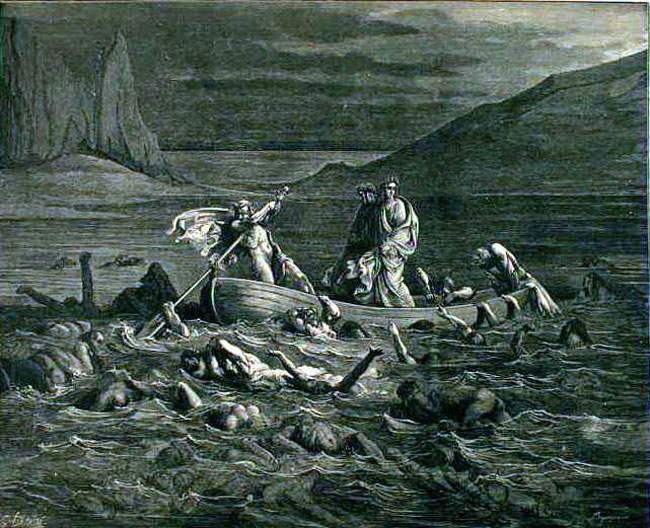Book Review at New York Review of Books
http://www.nybooks.com/articles/archive ... d-version/
Some random extracts
In Inferno 9, Dante challenges his audience with a direct address: You readers, who are of sound mind and memory, Pay attention to the lessons woven into the fabric Of these strange poetic lines.
it gives itself without prejudice to “Presbyterians and Pagans alike,” to borrow a phrase from Herman Melville, himself a great Dante enthusiast.
Gary Panter’s 2006 punk-pop graphic novel Jimbo’s Inferno was followed in 2009 by the popular video game Dante’s Inferno. Roberto Benigni’s long-running comedy routine “Tutto Dante” continues to draw huge audiences, and, oblivious to it all, the industry of Dante studies churns out ever more scholarly articles, monographs, and academic conferences.
this astonishingly bad novel
it is impossible finally to distinguish between the Comedy’s art and “the love that moves the sun and the other stars.”... this monumental poem has one overriding, all-consuming vocation, namely to probe, understand, and represent the nature of motion in its spiritual and cosmic manifestations.
Anyone who has experienced even mild forms of depression knows what the state of paralysis in Inferno 1 is all about.
Mary Jo Bang provides the most vivid, albeit not the most literal, version of the poem’s opening tercet:
Stopped mid-motion in the middle Of what we call our life, I looked up and saw no sky— Only a dense cage of leaf, tree, and twig. I was lost.
What did Dante learn from Virgil that made him eager to follow in his footsteps? He learned what it means to write a poem whose narrative not only moves but has movement as its prime directive... Like The Aeneid, The Divine Comedy propels both the journey and the poem forward through multiple mechanisms
Dante took great care to devise punishments that reveal in symbolic form what the inner will desires when it commits the corresponding sins
Much of the fascination of the Inferno revolves around Dante’s probing of the covert psychic recesses of his characters’ inner will... Oftentimes the characters themselves are unaware of the way they are masking their true motivations, which makes it all the more imperative that the reader adopt an analytic distance from their self-presentations. In sum, the Inferno educates the reader in the ways of deception and self-deception, and in that respect remains one of the great archives of human psychology.
An abyss separates the monodimensional crudeness of Brown’s narrative devices from the multidimensional complexity of Dante’s. Brown’s novel has a cast of characters, to be sure, yet it has no interest in tracking the inner motions of their souls or probing the muddled sources of their motivation. His characters are so thoroughly vapid and cartoonish that one suspects that Brown deliberately refrained from giving them any psychological density for fear that this would merely create friction on the high-speed rails on which his thriller races along.
the big difference between the sinners in Dante’s Hell and the penitents in his Purgatory is that the former are going nowhere, while the latter are moving toward a goal, namely the purgation of their sins and their eventual assumption into Paradise. In Purgatory time matters, and motion has a purpose. In Hell, by contrast, no matter how much the souls may be buffeted by storms, or run on burning sands, or carry heavy burdens, motion leads nowhere. In Dante’s vision Hell is a never-ending waste of time.
Dante subscribed to Plato’s notion that time, in its cosmological determinations, is “a moving image of eternity.” He subscribed furthermore to the Platonic and Aristotelian notion that the truest image of eternity in the material world is the circular motions of the heavens. Thus in Dante’s Paradiso, the heavenly spheres revolve in perfect circles around the “unmoved Mover,” namely God.
In the final analysis there are two kinds of motion in the world for Dante: the predetermined orderly motion of the cosmos, which revolves around the Godhead, and the undetermined motion of the human will, which is free to choose where to direct its desire—either toward the self or toward God.
The basic “plot” of The Divine Comedy has to do with the pilgrim’s efforts to complete a long, self-interrogating, and transformative journey at the end of which his inner being—which, like human history, suffers from the perversion of self-love—becomes harmonized with the love that moves the universe. Salvation means nothing more, and nothing less, than such harmonization.
integration of the pilgrim’s will with the turning motion of the universe represents a dramatic conclusion to a dramatic poem
as Beatrice puts it when she descends into Limbo to enlist Virgil to rescue Dante from his impasse in the dark wood: “Amor mi mosse, che mi fa parlare,” “love has moved me, and makes me speak.”




